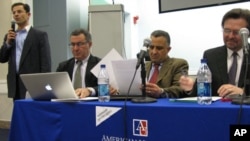A panel of Tunisia experts in Washington has called for urgently needed U.S. transitional help. But the experts also said the U.S. government should stop short of internal interference. The recommendations were made as demonstrations against a new government continued across Tunisia, just days after former 24-year President Zine El Abidine Ben Ali fled the north African country amid surging civilian protests.
Neil Hicks from the U.S-based group Human Rights First said the U.S. government has had little or no role in the sudden changes taking place in Tunisia.
"It was homegrown. In fact Tunisia was not really a high priority for U.S. foreign policy in the region and to the extent that U.S. policymakers thought about Tunisia, it was regarded as fairly problem-free. It was a well-run, authoritarian state. It had economic growth, it was peaceful and it cooperated on national security and combating terrorism," he said.
Panelists at American University in Washington said Tunisia’s long-time president who came to power in a coup was a long-time U.S. ally, but that when the protests began he received no U.S. support.
The U.S.-based Center for the Study of Islam and Democracy president, Tunisian-born Radwan Masmoudi urged U.S. officials not to have any favorites or parties they oppose, including those with Islamic leanings or Ben Ali ties. He said this was essential as Tunisia moves toward hoped for elections within six months.
"The United States, I think, should make clear that it does not take sides between parties. I think that would be a terrible mistake for the United States to take sides, and that we should emphasize the basic principle of democracy which is that all political parties must be recognized, must be legalized, and let the people say their final say," he said.
As part of the election process, panelists said Tunisia will need help with international observers and creating a new electoral framework.
A Tunisian professor at Georgetown University, Noureddine Jebnoun, said Tunisians will also need help with constitutional reform.
"What we want is to just throw in the trash this constitution and to move forward from this presidential regime to a parliamentary regime. This is the main goal of the Tunisians now," he said.
He also called for more U.S. help for Tunisia’s army. He said the army had been heroic when it refused orders to continue shooting on protesters.
Daniel Brumberg, an adviser with the U.S.-based Center for Conflict Analysis and Prevention, says U.S. officials will have to play a balanced but crucial role in promoting stability and democracy, however difficult that will be.
"Subtlety is not exactly something we do very well in foreign policy. Why is this important apart from trying to make things successful in Tunisia? It is important because in Tunisia, the United States supported Ben Ali for many years. I think we have an opportunity now to sort of address this dissonance, and if and when a democratic state, and I mean a pluralist democratic state emerges in Tunisia, we will then be in a better position to be more consistent in our advancing of democracy in the region," he said.
Even though the panelists applauded recent developments in Tunisia as historic within the context of Arab countries, north Africa and mostly Muslim nations, they said they did not believe in what they called a "tsunami effect" of similar popular movements being able, with or without outside help, to topple other corrupt, autocratic governments which dominate the region.
Tunisia Experts Call for US Transitional Help With Limits




